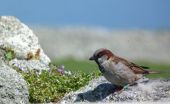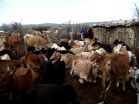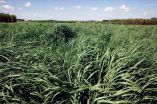Progeny of old parents have fewer offspring
Long-term study in house sparrows shows a transgenerational age effect
2015-03-09
(Press-News.org) This news release is available in German.
Reproduction at old age involves risks that may impact one's own life and may impose reduced biological fitness on the offspring. Such evidence, previously obtained in humans and other taxa under laboratory conditions, has now been confirmed by researchers from the Max Planck Institute for Ornithology in Seewiesen together with colleagues from the UK and New Zealand for the first time in free-living animals. In a long-term study on a population of house sparrows they found that offspring of older parents themselves produced fewer young. Such a transgenerational effect is important for the understanding of the evolution of longevity.
Fertility does not decrease in all taxa with increasing age but may remain constant lifelong as is the case of some invertebrates or may even increase with increasing age as in some reptiles. Generally both sexes are able to reproduce at old age, with males capable of producing more offspring than females. In some mammals such as humans male individuals remain fertile for a longer time compared to females that at some stage enter the menopause. However, reproducing at old age may incur risks such as a higher infant mortality or chromosomal anomalies. Moreover, children of old parents have themselves fewer offspring or have a shorter lifespan, which is commonly known as the "Lansing effect" that was demonstrated not only in humans but also in mice and some invertebrates in the laboratory but never in free living populations.
Julia Schroeder from the Max Planck Institute for Ornithology in Seewiesen has now investigated this effect in a population of house sparrows together with colleagues from the University of Sheffield and the University of Otago in New Zealand. Their study site is a small island off the coast of Devon in Southwestern England where the researchers have monitored and ringed the entire house sparrow population in the course of more than 10 years. The researchers took blood samples from the parents and their offspring in order to determine genetic parentage. That way they obtained a unique and detailed genetic pedigree of more than 5000 birds with a precise knowledge of the age and the number of offspring for each individual. Birds stayed the entire life on this remote island that is 19 km off the coast. During 12 years, only four sparrows could genetically not be assigned to parents living on the island, suggesting that these birds were immigrants. To test whether a possible effect is inherited or due to environmental factors entire clutches were systematically cross-fostered.
The analysis revealed a clear result. First, old mothers had a negative effect on the fitness of their daughters, meaning that these daughters produced fewer young. Similarly, older fathers produced sons that had fewer offspring. In particular, this has negative consequences for offspring that resulted from extra-pair matings, as a previous study has shown that house sparrow females seek extra-pair matings preferably with older males. Hence, according to the results of the present study, a female strategy to mate with viable males proves to be disadvantageous. "Thus, these results cannot be explained by changes of the environment but rather by the constitution of the parents, which changes with increasing age through epigenetic processes. This transgenerational age effect may change the selection pressure on longevity within a population", says Julia Schroeder, first author of the study. "The results are potentially important for breeding management programs of endangered species that often use old individuals from different populations to maintain genetic variability", adds the researcher.
INFORMATION:
Original publication:
Julia Schroeder, Shinichi Nakagawa, Mark Rees, Maria Elena Mannarelli, Terry Burke
Reduced fitness in progeny from old parents in a natural population
PNAS
[Attachments] See images for this press release:

ELSE PRESS RELEASES FROM THIS DATE:
2015-03-09
Nearly three out of four Chinese adults have poor cardiovascular health, with poor diet and growing rates of obesity compounding the risks associated with continuing high rates of smoking, according to a new survey published in the Journal of the American College of Cardiology.
The 2010 China Noncommunicable Disease Surveillance Group collected cardiovascular health data from a nationally representative sample of more than 96,000 men and women in the general Chinese population. According to estimates derived from the survey results, just 0.2 percent of Chinese men and ...
2015-03-09
People in a society are bound together by a set of connections - a social network. Cooperation between people in the network is essential for societies to prosper, and the question of what drives the emergence and sustainability of cooperation is a fundamental one.
What we know about other people in a network informs how much we are willing to cooperate with them. By conducting a series of online experiments, researchers explored how two key areas of network knowledge effect cooperation in decision-making: what we know about the reputation and social connections of those ...
2015-03-09
A new study suggests that increases in atmospheric CO2 could intensify extreme droughts in tropical and subtropical regions -- such as Australia, the southwest and central United States, and southern Amazonia -- at much a faster rate than previously anticipated, explains University of Texas at Austin professor Rong Fu in a commentary in the March 9 edition of Proceedings of the National Academy of Sciences.
Fu, a professor at the university's Jackson School of Geosciences, writes about a new study by William K.M. Lau of the University of Maryland and Kyu-Myong Kim of the ...
2015-03-09
Once green, the Sahara expanded 5,500 years ago, leading ancient herders to follow the rain and grasslands south to eastern Africa. But about 2,000 years ago, their southward migration stalled out, stopped in its tracks, archaeologists presumed, by tsetse-infested bush and disease.
As the theory goes, the tiny tsetse fly altered the course of history, stopping the spread of domesticated animal herding with a bite that carries sleeping sickness and nagana, diseases often fatal for the herder and the herded.
Now, isotopic research on animal remains from a nearly 2,000-year-old ...
2015-03-09
Despite extensive historical knowledge about the African slave trade - including trends in the volume and demographics of the roughly 12 million people shipped from West and West Central Africa to the New World between 1500 and 1850 - fundamental details about their ethnic and geographical origins remain elusive. Dr. Hannes Schroeder from the Centre for GeoGenetics at the Natural History Museum, University of Copenhagen, who led the study, explains:
- There are historical records - merchant ledgers, shipping records and the like - but they tend to refer to coastal shipping ...
2015-03-09
In the ongoing Ebola outbreak in West Africa, whose death toll is approaching 10,000, little information has been available about how the human immune response unfolds after infection.
Researchers from Emory and the Centers for Disease Control and Prevention have now obtained a first look at the immune responses in four Ebola virus disease survivors who received care at Emory University Hospital in 2014, by closely examining their T cells and B cells during the acute phase of the disease. The findings reveal surprisingly high levels of immune activation, and have implications ...
2015-03-09
March 9, 2015
PITTSBURGH--To fully understand how nanomaterials behave, one must also understand the atomic-scale deformation mechanisms that determine their structure and, therefore, their strength and function.
Researchers at the University of Pittsburgh, Drexel University, and Georgia Tech have engineered a new way to observe and study these mechanisms and, in doing so, have revealed an interesting phenomenon in a well-known material, tungsten. The group is the first to observe atomic-level deformation twinning in body-centered cubic (BCC) tungsten nanocrystals. ...
2015-03-09
COLUMBUS, Ohio - Children whose parents think they're God's gift to the world do tend to outshine their peers - in narcissism.
In a study that aimed to find the origins of narcissism, researchers surveyed parents and their children four times over one-and-a-half years to see if they could identify which factors led children to have inflated views of themselves.
Results showed that parents who "overvalued" their children when the study began ended up with children who scored higher on tests of narcissism later on.
Overvalued children were described by their parents ...
2015-03-09
A new study of Tourette syndrome (TS) led by researchers from UC San Francisco and Massachusetts General Hospital (MGH) has found that nearly 86 percent of patients who seek treatment for TS will be diagnosed with a second psychiatric disorder during their lifetimes, and that nearly 58 percent will receive two or more such diagnoses.
It has long been known that TS, which emerges in childhood and is characterized by troublesome motor and vocal tics, is often accompanied by other disorders, especially attention-deficit hyperactivity disorder (ADHD) and obsessive-compulsive ...
2015-03-09
If advanced biofuels are to replace gasoline, diesel and jet fuel on a gallon-for-gallon basis at competitive pricing, we're going to need a new generation of fuel crops - plants designed specifically to serve as feedstocks for fuels. Researchers with the U.S. Department of Energy (DOE)'s Joint BioEnergy Institute (JBEI) have demonstrated the power of a new ally in this effort - proteomics!
In a study led by Benjamin Schwessinger, a grass geneticist with JBEI's Feedstocks Division, researchers used advanced proteomic techniques to identify 1,750 unique proteins in shoots ...
LAST 30 PRESS RELEASES:
[Press-News.org] Progeny of old parents have fewer offspring
Long-term study in house sparrows shows a transgenerational age effect


